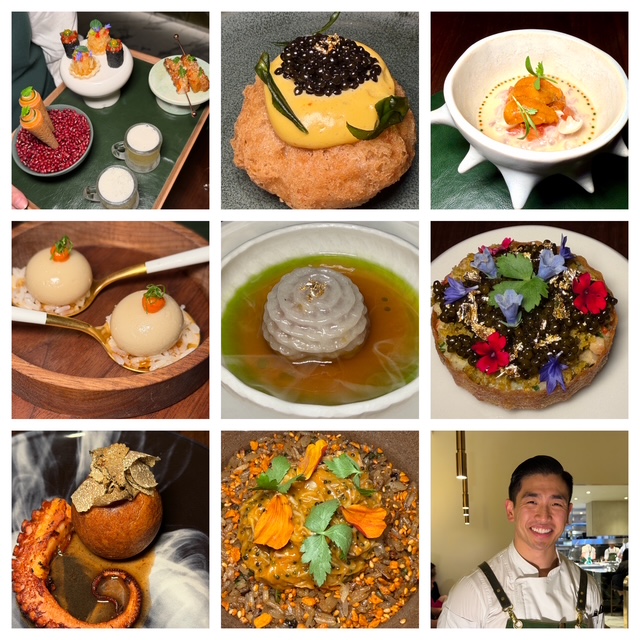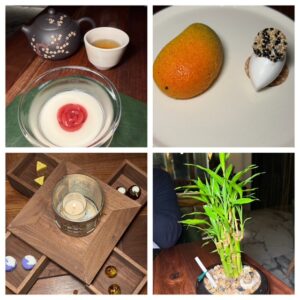
Michelin has been in Canada for only a few years, and while not every award has felt equally deserved, the guide has undeniably pushed Canada onto the global culinary stage. It’s given talented chefs the chance to showcase their creativity, their technique, and the bounty of Canadian ingredients. One of the newest and truly worthy additions in
Toronto is
Akin, which earned its first
Michelin star in the 2025 edition.
Located at 51 Colborne Street, Akin describes itself as a Modern
Asian fine dining establishment. It offers a 10-course blind tasting menu inspired by
Japan, Thailand, Singapore, Malaysia, Hong Kong, Vietnam, and more—classic Asian flavours reimagined with innovative techniques and seasonal local ingredients where possible.
The space is intimate and attractive, seating about 28 guests, plus a four-seat chef’s counter facing the open kitchen and an eight-seat private dining room. The room features a chill soundtrack, wooden tables, porcelain tile floors, forest-green leather chairs, light brown leather banquettes, and a dramatic double-helix light fixture running the length of the dining room. A central island doubles as both service and storage, and the beautiful, largely handcrafted tableware enhances the experience. Staff wear white shirts with green vests or aprons, reinforcing the restaurant’s cohesive aesthetic.
“Akin” means “similar or related to,” and our menu—updated frequently—played on street-food inspirations elevated with touches of molecular gastronomy. We enjoyed seven savoury courses and three sweet ones, with the option to add either a wagyu course or a lobster-and-caviar course. We chose the lobster and caviar, and it was one of the evening’s highlights: a stunning composition of bright edible florals atop Nova Scotia lobster and caviar.
Presentations throughout the meal were sophisticated and artistic. Akin is owned by chef Eric Chong, MasterChef Canada’s first winner, along with his partner Alvin Leung, who holds three Michelin stars in Asia. The meal lasts about 2.5 to 3 hours, but flows smoothly. The price is steep—$275, or $350 for the chef’s counter, which features premium ingredients—but each dish feels thoughtfully crafted and visually striking.
The meal begins with a set of snacks reminiscent of the
three-star restaurant Jungsik in
New York, with interpretations of banh mi, satay, kimbap, salad, and a sugarcane–coconut–lime leaf drink reminiscent of a light beer. Next came a chicken karaage topped with caviar, salted duck egg, and curry leaf; then a tom yum with Hokkaido uni and cubed hiramasa. The molecular Hainan chicken and rice arrives as a single bite that bursts with flavour.
We also had a chicken-and-rice soup featuring a dumpling with 150 hand-pinches, topped with gold leaf, in a broth of kecap manis, sambal, and jasmine rice. My least favourite dish

was the takoyaki—a large, spherical beignet with an indistinct filling, topped with Périgord truffles—though the accompanying octopus was tender and well-executed. The chilli Dungeness crab that followed was exceptional, served with crispy rice; I scraped the bowl clean.
Desserts included an almond-milk panna cotta with kefir and Ontario strawberries; a playful take on mango sticky rice where the “mango” was actually a cake, served with coconut sorbet and a sesame
cookie; and finally, a surprise box filled with petits fours.
The global wine list, creative cocktails, and optional $135 pairings complement the menu well. I loved my Shinobi Negroni, and there are also low- and zero-ABV options. Each course was explained in detail, and the service was warm, attentive, and knowledgeable.
Akin is, in my view, fully deserving of its Michelin star and worthy of a spot on Canada’s 100 Best list.
Recommended.
Happy dining,
Shanea
11/20/2025

 was the takoyaki—a large, spherical beignet with an indistinct filling, topped with Périgord truffles—though the accompanying octopus was tender and well-executed. The chilli Dungeness crab that followed was exceptional, served with crispy rice; I scraped the bowl clean.
was the takoyaki—a large, spherical beignet with an indistinct filling, topped with Périgord truffles—though the accompanying octopus was tender and well-executed. The chilli Dungeness crab that followed was exceptional, served with crispy rice; I scraped the bowl clean.